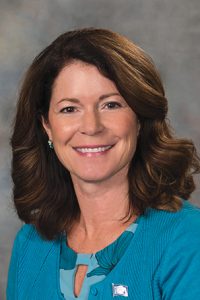Array of criminal justice reform programs proposed
A bill that would establish a variety of criminal justice reform programs was heard by the Judiciary Committee Feb. 1.

LB50, introduced by Lincoln Sen. Suzanne Geist, would create several programs for the purpose of improving the state’s criminal justice system, including a program to expand problem-solving courts, a pilot program to establish parole-violation residential housing and creation of a probationer incentive program.
During the 2022 legislative session, Geist offered an amendment to LB920, a criminal justice reform measure introduced by former Omaha Sen. Steve Lathrop that stalled on the first round of debate. LB50, she said, is a combination of LB920 and her previously offered amendment based on consensus items from the 2021 Criminal Justice Reinvestment Group.
“We need to focus on rehabilitation, providing good programming and safe and secure housing for those who are exiting our criminal justice system,” Geist said. “We also need to continue to provide opportunities for people to succeed and become productive members of our state.”
The bill contains a number of provisions designed to address courts, reentry, release and supervision, including:
• requiring each judicial district to establish a problem-solving court;
• creating a pilot program to administer virtual behavioral health treatment for court-involved individuals;
• requiring a court or a probation officer to notify an offender who may be eligible for a set-aside and information on filing a petition;
• creating a pilot program to hire assistant probation officers in a probation district;
• providing for streamlined parole contracts for qualified offenders;
• prioritizing restitution payments;
• establishing a housing program for parolees who commit technical parole violations; and
• terminating the Committee on Justice Reinvestment Oversight.
Bob Denton, deputy probation administrator for the Adult Probation Services Division, testified in support of the bill. As of 2022, Denton said, 84 percent of individuals who completed problem-solving court have remained crime-free for at least three years after release.
“In relation to criminal justice reform, problem-solving courts and probation have consistently risen to the top as an effective solution for reducing recidivism … however, we need more,” Denton said.
Jasmine Harris, testifying on behalf of RISE — a nonprofit focused on prison programming and reentry — also spoke in support. The technical parole-violation housing pilot program would provide resources and support to individuals with mental health and substance abuse problems, she said, instead of reincarcerating them.
“Forty percent of people who returned to the department of corrections were due to technical violations of parole, so that would be a significant [relief] to some of the prison population overcrowding,” Harris said.
Spike Eickholt, speaking on behalf of the ACLU of Nebraska and the Nebraska Criminal Defense Attorneys Association, testified in support of the bill. Currently, Eickholt said, restitution payments are considered along with court costs, fines and probation fees. Under LB50, restitution payments to victims would be prioritized, he said.
Timothy Melcher, representing Nebraskans Unafraid, testified against the bill. Melcher said individuals convicted of sex crimes also should be considered for streamlined parole because they already are part of a monitoring program upon release from incarceration.
The committee took no immediate action on LB50.

